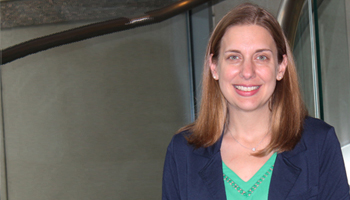HOW CAN WE HELP YOU? Call 1-800-TRY-CHOP
In This Section
Protecting Breastfed Babies in the First Days of Life: Q&A with Rebecca Ahrens-Nicklas, MD
 More mothers are breastfeeding than ever before. However, getting breastfeeding going can be difficult. Babies with inherited metabolic disorders, such as medium-chain acyl-CoA dehydrogenase deficiency (let’s just call it MCAD) can be especially vulnerable to low blood sugar if they aren’t getting enough milk in the early days of breastfeeding. And while neonatologists and metabolic physicians have already gotten the hang of how to treat diagnosed MCAD, surprising new research shows a certain subset of newborns get ill before their MCAD screening results can even return to the doctor’s hands. These newborns have one thing in common, according to Rebecca Ahrens-Nicklas, MD, PhD, fellow in the divisions of Human Genetics and Metabolism at Children’s Hospital of Philadelphia: They were exclusively breastfed. We chatted with Dr. Ahrens-Nicklas, who won the 2017 Richard King Trainee Award given by the American College of Medical Genetics and Genomics (ABMG) Foundation for her outstanding research paper on the subject published in ABMG’s peer-reviewed journal, Genetics in Medicine, to learn more about what this means for new moms.
More mothers are breastfeeding than ever before. However, getting breastfeeding going can be difficult. Babies with inherited metabolic disorders, such as medium-chain acyl-CoA dehydrogenase deficiency (let’s just call it MCAD) can be especially vulnerable to low blood sugar if they aren’t getting enough milk in the early days of breastfeeding. And while neonatologists and metabolic physicians have already gotten the hang of how to treat diagnosed MCAD, surprising new research shows a certain subset of newborns get ill before their MCAD screening results can even return to the doctor’s hands. These newborns have one thing in common, according to Rebecca Ahrens-Nicklas, MD, PhD, fellow in the divisions of Human Genetics and Metabolism at Children’s Hospital of Philadelphia: They were exclusively breastfed. We chatted with Dr. Ahrens-Nicklas, who won the 2017 Richard King Trainee Award given by the American College of Medical Genetics and Genomics (ABMG) Foundation for her outstanding research paper on the subject published in ABMG’s peer-reviewed journal, Genetics in Medicine, to learn more about what this means for new moms.
Can you describe MCAD for us in everyday terms?
MCAD is a disorder where a baby can’t use medium chain fats for energy. It affects about one out of every 15,000 infants, however some populations have rates as high as one out of every 7,500 infants. If a baby with MCAD is not feeding well or is sick, they are at risk for developing low blood sugar. Newborn screening was developed for this disease because the babies looked perfectly healthy, so no one would know that they’re at risk for hypoglycemia until it was too late. With newborn screening, you identify these babies, and anytime they’re sick, you give them extra calories, and for the most part, they do very well. Treated MCAD children have normal life expectancy and normal cognition. They’re normal happy, healthy kids.
What is the current problem with MCAD?
The problem is that before you know a newborn has MCAD, while you’re waiting for the newborn screen to come back (which usually takes about five days in Pennsylvania), these babies are at risk of having low blood sugar. The risk is highest if they aren’t feeding well, if their mom’s breast milk hasn’t come in, or if they are sick for another reason. That’s where my project really came from: the concern that moms with their brand-new babies have no idea that they are at risk for low blood sugar due to MCAD (or another metabolic disorder) because the newborn screen is not back.
Can you describe what your research study found?
This project started during my fellowship here. We had a number of babies who got sick before their newborn screens were back and turned out to have MCAD. Low blood sugar can cause MCAD infants to become excessively sleepy or even nonresponsive. We thought MCAD was a very treatable disease with good outcomes since newborn screening started, so we were surprised by this. We looked into the data and found that a large number of infants who had problems were exclusively breastfed.
We then examined our wider population of children identified with MCAD in the past six years, and only babies who were exclusively breastfed had episodes of hypoglycemia. Out of 24 exclusively breastfed infants with MCAD, 11 became sick before their newborn screen results were back. None of the 19 formula-supplemented infants with MCAD in our population got sick.
Were there any other signs common to all these families?
On retrospective discussion with the family, everyone said they were having problems initiating breastfeeding, such as concerns about supply or the baby’s ability to latch. Many said they had not received adequate lactation support.

If we had known that the baby would have MCAD, the family could have supplemented with formula or pumped milk until the mother’s supply came in. This would have ensured that the infant was getting enough milk, and significantly decreased the risk of the baby having a low blood sugar. A lot of these families have gone on to have other children, and most supplement until we know if the child has MCAD. We have mom pump until she establishes a good supply and breastfeeding relationship, and the infants do quite well.
What’s the most important takeaway for doctors?
It is important that pediatricians and nurses working in well baby nurseries and primary care offices listen to families when they have concerns about feeding, especially before the newborn screen is back. In addition to weighing the babies to make sure they’re not losing excessive weight, we need to inquire if parents are having concerns that the babies aren’t eating enough, and provide good lactation support. As a pediatrics community, we need to come up with better ways to monitor breastfeeding establishment, because it can be rough in the first couple of days.
What’s the most important takeaway for moms?
Breastfeeding your baby is important, but it’s not always as easy as people say it is going to be. If you have concerns that you think your baby is not getting enough, talk to your doctors, talk to your lactation consultants, and don’t stop until your concerns are heard. And I think that’s the message that the families have brought forth with us: that they were happy that they were trying to breastfeed, but they wished that somebody had been a little more responsive, because it is not an easy process.
Also, I want to emphasize to new parents that newborn screening is a very important screening test done on every baby born in the United States. It serves this exact purpose, to pick up things that are exquisitely treatable so that kids can grow and develop well.
Any final words?
I think the take home message is that breastfeeding is important but it needs to be done in a thoughtful way, especially before we know a baby’s newborn screen results. If a family has any concerns about how breastfeeding establishment is going, they should ask for help from their doctor, nurse, or lactation consultant.
For more information on MCAD and Dr. Ahrens-Nicklas’ research, the paper is available online in Genetics in Medicine.